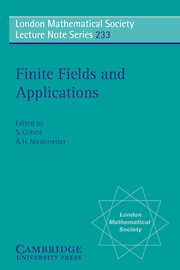 Finite Fields and Applications
Finite Fields and Applications Book contents
- Frontmatter
- Contents
- Preface
- Conference Participants
- Factorizations over finite fields
- Class number in totally imaginary extensions of totally real function fields
- Automorphism groups and permutation groups of affine-invariant codes
- A construction of bent functions
- Monodromy groups of classical families over finite fields
- Wan's bound for value sets of polynomials
- Comparative implementations of Berlekamp's and Niederreitor's polynomial factorization algorithms
- On the minimal polynomials for certain Gauss periods over finite fields
- Completely free elements
- Exponential sums over Galois rings and their applications
- Maximal sets of mutually orthogonal Latin squares
- Examples of small hybrid sums
- Cellular automata, substitutions and factorization of polynomials over finite fields
- A new class of two weight codes
- Construction of digital (t, m, s)-nets from linear codes
- A family of exceptional polynomials in characteristic three
- Estimates of character sums arising from finite upper half planes
- Carmichael-Carlitz polynomials and Fermat-Carlitz quotients
- Open problems and conjectures in finite fields
- Quasirandom points and global function fields
- Use characteristic sets to decode cyclic codes up to actual minimum distance
- Approximate constructions in finite fields
- Periodicity properties of kth order linear recurrences whose characteristic polynomial splits completely over a finite field, II
- Factoring cyclotomic polynomials over large finite fields
- Character sums and coding theory
- L-functions of algebraic varieties over finite fields: rationality, meromorphy and entireness
- Some congruences and identities for generalizations of Rédei functions
Exponential sums over Galois rings and their applications
Published online by Cambridge University Press: 29 September 2009
- Frontmatter
- Contents
- Preface
- Conference Participants
- Factorizations over finite fields
- Class number in totally imaginary extensions of totally real function fields
- Automorphism groups and permutation groups of affine-invariant codes
- A construction of bent functions
- Monodromy groups of classical families over finite fields
- Wan's bound for value sets of polynomials
- Comparative implementations of Berlekamp's and Niederreitor's polynomial factorization algorithms
- On the minimal polynomials for certain Gauss periods over finite fields
- Completely free elements
- Exponential sums over Galois rings and their applications
- Maximal sets of mutually orthogonal Latin squares
- Examples of small hybrid sums
- Cellular automata, substitutions and factorization of polynomials over finite fields
- A new class of two weight codes
- Construction of digital (t, m, s)-nets from linear codes
- A family of exceptional polynomials in characteristic three
- Estimates of character sums arising from finite upper half planes
- Carmichael-Carlitz polynomials and Fermat-Carlitz quotients
- Open problems and conjectures in finite fields
- Quasirandom points and global function fields
- Use characteristic sets to decode cyclic codes up to actual minimum distance
- Approximate constructions in finite fields
- Periodicity properties of kth order linear recurrences whose characteristic polynomial splits completely over a finite field, II
- Factoring cyclotomic polynomials over large finite fields
- Character sums and coding theory
- L-functions of algebraic varieties over finite fields: rationality, meromorphy and entireness
- Some congruences and identities for generalizations of Rédei functions
Summary
Abstract – Recently, a new direction in coding theory has been to apply the Gray map to codes that are linear over Z4 to obtain binary nonlinear codes better than comparable binary linear codes. The distance properties of these codes as well as the correlation properties of sequences obtained from Z4-linear codes depend in many cases on exponential sums over Galois rings. We present a survey of recent results on exponential sums over Galois rings and their applications to coding theory and sequence designs.
Keywords – Coding theory, cyclic codes, sequences, exponential sums, Galois rings, Z4-linear codes.
Introduction
In an important paper, Hammons et. al. show how to construct well known binary nonlinear codes like Kerdock codes and Delsarte-Goethals codes by applying the Gray map to linear codes over Z4. Further, they explain an old open problem in coding theory that the weight enumerators of the nonlinear Kerdock codes and Preparata codes satisfy the MacWilliams identities. Nechaev has shown that the Kerdock code punctured in two coordinates, is equivalent to a cyclic (but still nonlinear) code. The coordinate permutation that yields the binary cyclic code is identified by making a connection between the Kerdock code and a Z4-linear code. These discoveries lead to a strong interest in Z4-linear codes, and recently several other binary nonlinear codes which are better than comparable binary linear codes have been found using the Gray map on Z4-linear codes.
Many of the new codes are constructed from extended cyclic codes over Z4.
- Type
- Chapter
- Information
- Finite Fields and ApplicationsProceedings of the Third International Conference, Glasgow, July 1995, pp. 109 - 128Publisher: Cambridge University PressPrint publication year: 1996
- 7
- Cited by
